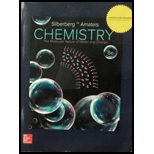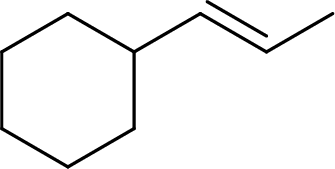
Concept explainers
(a)
Interpretation:
The given structure exhibit geometric isomerism or not has to be given and two isomers have to be drawn and named for the given structure.

Concept Introduction:
The geometric isomers are said to be the isomers which shows different orientation of groups around a double bond. The geometric isomers are also known as cis-trans isomers.
When two similar or higher priority groups are attached to the carbon on same side, it is said to be cis-isomer.
When two similar or higher priority groups are attached to the carbon on opposite sides, it is said to be trans-isomer.
To exhibit the geometric isomerism, a molecule should have double bonded carbon atoms (
(b)
Interpretation:
The given structure exhibit geometric isomerism or not has to be given and two isomers has to be drawn and named for the given structure.

Concept Introduction:
The geometric isomers are said to be the isomers which shows different orientation of groups around a double bond. The geometric isomers are also known as cis-trans isomers.
When two similar or higher priority groups are attached to the carbon on same side, it is said to be cis-isomer.
When two similar or higher priority groups are attached to the carbon on opposite sides, it is said to be trans-isomer.
To exhibit the geometric isomerism, a molecule should have double bonded carbon atoms (
(c)
Interpretation:
The given structure exhibit geometric isomerism or not has to be given and two isomers has to be drawn and named for the given structure.

Concept Introduction:
The geometric isomers are said to be the isomers which shows different orientation of groups around a double bond. The geometric isomers are also known as cis-trans isomers.
When two similar or higher priority groups are attached to the carbon on same side, it is said to be cis-isomer.
When two similar or higher priority groups are attached to the carbon on opposite sides, it is said to be trans-isomer.
To exhibit the geometric isomerism, a molecule should have double bonded carbon atoms (
Want to see the full answer?
Check out a sample textbook solution
Chapter 15 Solutions
CHEMISTRY >CUSTOM<
 ChemistryChemistryISBN:9781305957404Author:Steven S. Zumdahl, Susan A. Zumdahl, Donald J. DeCostePublisher:Cengage Learning
ChemistryChemistryISBN:9781305957404Author:Steven S. Zumdahl, Susan A. Zumdahl, Donald J. DeCostePublisher:Cengage Learning ChemistryChemistryISBN:9781259911156Author:Raymond Chang Dr., Jason Overby ProfessorPublisher:McGraw-Hill Education
ChemistryChemistryISBN:9781259911156Author:Raymond Chang Dr., Jason Overby ProfessorPublisher:McGraw-Hill Education Principles of Instrumental AnalysisChemistryISBN:9781305577213Author:Douglas A. Skoog, F. James Holler, Stanley R. CrouchPublisher:Cengage Learning
Principles of Instrumental AnalysisChemistryISBN:9781305577213Author:Douglas A. Skoog, F. James Holler, Stanley R. CrouchPublisher:Cengage Learning Organic ChemistryChemistryISBN:9780078021558Author:Janice Gorzynski Smith Dr.Publisher:McGraw-Hill Education
Organic ChemistryChemistryISBN:9780078021558Author:Janice Gorzynski Smith Dr.Publisher:McGraw-Hill Education Chemistry: Principles and ReactionsChemistryISBN:9781305079373Author:William L. Masterton, Cecile N. HurleyPublisher:Cengage Learning
Chemistry: Principles and ReactionsChemistryISBN:9781305079373Author:William L. Masterton, Cecile N. HurleyPublisher:Cengage Learning Elementary Principles of Chemical Processes, Bind...ChemistryISBN:9781118431221Author:Richard M. Felder, Ronald W. Rousseau, Lisa G. BullardPublisher:WILEY
Elementary Principles of Chemical Processes, Bind...ChemistryISBN:9781118431221Author:Richard M. Felder, Ronald W. Rousseau, Lisa G. BullardPublisher:WILEY





